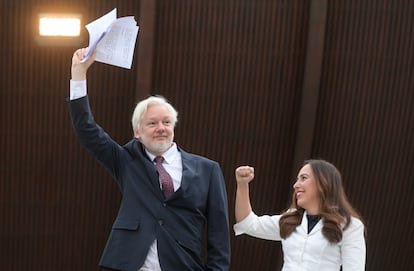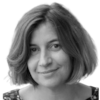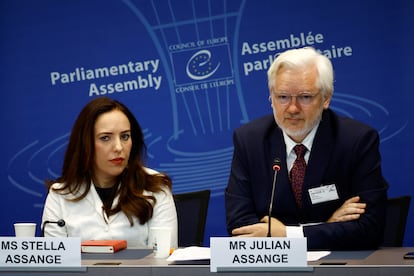Julian Assange: ‘I am free because I pleaded guilty to journalism’
The WikiLeaks founder made his first public appearance since his release before a committee of the Council of Europe in Strasbourg, France


WikiLeaks founder Julian Assange on Tuesday broke the silence he had maintained since his release in June after spending 12 years deprived of freedom. And he stressed that he can now move around again without fear of being arrested or extradited to the United States not because the system or the safeguards provided to protect freedom of expression worked, but because he gave in to pressure and pleaded guilty to conducting journalism.
“I want to be clear: I am not free today because the system worked,” he said. “If I am free, it is because I pled guilty to seeking information from a source. I pled guilty to obtaining information from a source. And I pled guilty to informing the public what that information was. I pled guilty to nothing else,” the Australian activist said during a hearing of the Committee on Legal Affairs and Human Rights of the Parliamentary Assembly of the Council of Europe (PACE), in Strasbourg, France. Assange has asked institutions to “act” so that what happened to him for publishing classified information “does not happen again.”
“Journalism is not a crime”
“A journalist should not be persecuted for doing his job, journalism is not a crime, it is a pillar of a free and informed society,” he stressed to applause from lawmakers, whom he asked not to let down their guard. “If there is a future in Europe today in which the freedom to speak and publish the truth is not the privilege of a few, but the right of all, they must act so that what happened in my case never happens to anyone again.” Starting, he said, by reviewing the legal protections for whistleblowers because “many exist only on paper.”
His presence at the Council of Europe on Tuesday and Wednesday, where his case and the “chilling effects on human rights” it has had are being discussed, constitutes Assange’s first trip outside his native Australia since, following an agreement with the U.S. justice system, he was released at the end of June from the maximum-security British prison where he spent the last five years. It is also the first time that the 53-year-old has broken his silence. And he has done so to reveal that part of the agreement with the U.S. Department of Justice implies the impossibility of him being able to legally challenge the harassment he underwent for more than a decade, the extradition procedure, or requesting access to records of his case through the Freedom of Information Act (FOIA).

Assange, dressed in a suit and with a well-groomed beard, arrived at the Council of Europe headquarters early in the morning accompanied by his wife, the lawyer Stella Assange. The publisher made no statements to the press before entering the room, where he spoke for an hour before lawmakers from the 46 member states of the Strasbourg-based institution.
His statement was punctuated by fits of coughing and pauses, and Assange said he is still trying to “readjust” to normal life after more than a decade of being locked up, first for seven years in the Ecuadorian embassy in London, and then in a maximum-security British prison. “I have lost 14 years of my life,” he has said on several occasions. It was in 2010 when the legal process against him began after he was accused by Swedish prosecutors of sexual harassment.
“I have come a long way to be here, literally and figuratively,” he said, indicating that the isolation he was subjected to for so many years “takes its toll.” “Speaking here is a challenge,” he admitted.
Sign up for our weekly newsletter to get more English-language news coverage from EL PAÍS USA Edition
Tu suscripción se está usando en otro dispositivo
¿Quieres añadir otro usuario a tu suscripción?
Si continúas leyendo en este dispositivo, no se podrá leer en el otro.
FlechaTu suscripción se está usando en otro dispositivo y solo puedes acceder a EL PAÍS desde un dispositivo a la vez.
Si quieres compartir tu cuenta, cambia tu suscripción a la modalidad Premium, así podrás añadir otro usuario. Cada uno accederá con su propia cuenta de email, lo que os permitirá personalizar vuestra experiencia en EL PAÍS.
¿Tienes una suscripción de empresa? Accede aquí para contratar más cuentas.
En el caso de no saber quién está usando tu cuenta, te recomendamos cambiar tu contraseña aquí.
Si decides continuar compartiendo tu cuenta, este mensaje se mostrará en tu dispositivo y en el de la otra persona que está usando tu cuenta de forma indefinida, afectando a tu experiencia de lectura. Puedes consultar aquí los términos y condiciones de la suscripción digital.








































